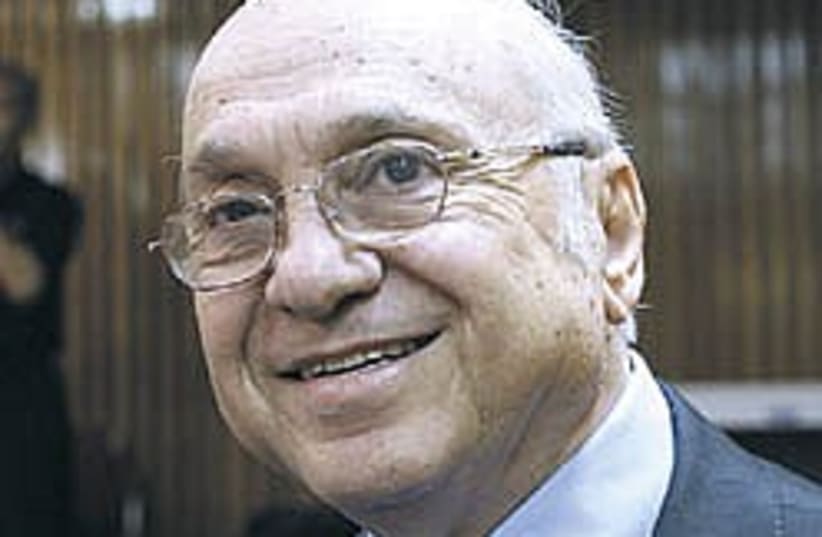Friedmann's critics are cautiously hopeful about successor Neeman
According to Hebrew University law professor Claude Klein, Neeman, like Friedmann, has been a critic of the Supreme Court's activism.
 (photo credit: Ariel Jerozolimski)
Leading figures in the legal profession who opposed former justice minister Daniel Friedmann's campaign to reduce the powers of the Supreme Court seemed cautiously hopeful on Thursday that the era of his successor, Yaakov Neeman, would be more harmonious.
"It's hard to say [what his term will be like]," said Hebrew University law professor Mordechai Kremnitzer. "Anything is possible. It's up to him."
Association for Civil Rights legal adviser Dan Yakir also adopted a wait-and-see attitude. He did not necessarily expect the new justice minister to follow in his predecessor's footsteps. "He understands the importance of the judicial system and its independence," Yakir said.
According to Hebrew University law professor Claude Klein, Neeman, like Friedmann, has been a critic of the Supreme Court's activism, and in that sense, he will likely advance some of Friedmann's ideas.
"However," Klein continued, "there will nothing of the Friedmann style of conduct. Neeman knows how to behave. He has a great deal of respect for the Supreme Court."
As a result of his approach, he would succeed a great deal more than Friedmann in achieving his goals, Klein added.
He also said that "unlike Friedmann, there is nothing personal in Neeman's criticism of the court."
Friedmann was often accused of having a vendetta against the court and its president, Dorit Beinisch, because Beinisch blocked the appointment of his protégé, Tel Aviv law professor Nili Cohen, to the court.
Klein said he did not rule out the possibility that Neeman would advance Friedmann's initiative to limit the court's power to abrogate laws. Friedmann introduced a bill allowing the Knesset to override High Court decisions revoking Knesset laws on the grounds that they violated Basic legislation such as the Basic Law: Human Dignity and Freedom.
On the other hand, Klein said he did not believe Neeman would continue Friedmann's campaign to restrict the areas of government - such as security and citizenship matters - in which the court could intervene. He added, however, that in the past year and a half the court has begun to voluntarily reduce its intervention, not because of legislation, but because it sensed the public atmosphere against its previous degree of activism.
Kremnitzer said he had reason to hope that Neeman would stay away from issues involving the relations between the government and the court because of his expressed concern over protracted legal procedures.
"Neeman has been speaking out very strongly against this matter and if he decides to go in this direction, he can do a lot to alleviate it," Kremnitzer said. "It can indeed be alleviated and he can also obtain the cooperation of the judicial system itself to accomplish this. If he does this, he will play a very important role."
(photo credit: Ariel Jerozolimski)
Leading figures in the legal profession who opposed former justice minister Daniel Friedmann's campaign to reduce the powers of the Supreme Court seemed cautiously hopeful on Thursday that the era of his successor, Yaakov Neeman, would be more harmonious.
"It's hard to say [what his term will be like]," said Hebrew University law professor Mordechai Kremnitzer. "Anything is possible. It's up to him."
Association for Civil Rights legal adviser Dan Yakir also adopted a wait-and-see attitude. He did not necessarily expect the new justice minister to follow in his predecessor's footsteps. "He understands the importance of the judicial system and its independence," Yakir said.
According to Hebrew University law professor Claude Klein, Neeman, like Friedmann, has been a critic of the Supreme Court's activism, and in that sense, he will likely advance some of Friedmann's ideas.
"However," Klein continued, "there will nothing of the Friedmann style of conduct. Neeman knows how to behave. He has a great deal of respect for the Supreme Court."
As a result of his approach, he would succeed a great deal more than Friedmann in achieving his goals, Klein added.
He also said that "unlike Friedmann, there is nothing personal in Neeman's criticism of the court."
Friedmann was often accused of having a vendetta against the court and its president, Dorit Beinisch, because Beinisch blocked the appointment of his protégé, Tel Aviv law professor Nili Cohen, to the court.
Klein said he did not rule out the possibility that Neeman would advance Friedmann's initiative to limit the court's power to abrogate laws. Friedmann introduced a bill allowing the Knesset to override High Court decisions revoking Knesset laws on the grounds that they violated Basic legislation such as the Basic Law: Human Dignity and Freedom.
On the other hand, Klein said he did not believe Neeman would continue Friedmann's campaign to restrict the areas of government - such as security and citizenship matters - in which the court could intervene. He added, however, that in the past year and a half the court has begun to voluntarily reduce its intervention, not because of legislation, but because it sensed the public atmosphere against its previous degree of activism.
Kremnitzer said he had reason to hope that Neeman would stay away from issues involving the relations between the government and the court because of his expressed concern over protracted legal procedures.
"Neeman has been speaking out very strongly against this matter and if he decides to go in this direction, he can do a lot to alleviate it," Kremnitzer said. "It can indeed be alleviated and he can also obtain the cooperation of the judicial system itself to accomplish this. If he does this, he will play a very important role."

